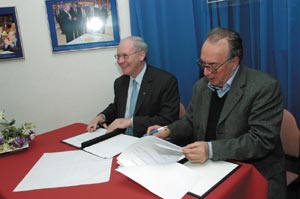
On 4 December 2003 a Memorandum of Understanding (MoU) between CERN and the government of New Zealand was signed in the presence of Peter Hamilton, New Zealand’s ambassador to Switzerland. This MoU concerns the further development of scientific and technical co-operation in high-energy particle physics between Ernest Rutherford’s birthplace and CERN, which now hosts one of the world’s most ambitious scientific endeavours, the Large Hadron Collider (LHC).
In anticipation of the MoU, two New Zealand universities (the University of Auckland and the University of Canterbury in Christchurch) have already joined the CMS collaboration to work on pixel detectors, where they can benefit from the expertise of the pixel group at the Paul Scherrer Institute. These detectors are not only valuable in high-energy particle physics, but also serve medical applications.
As a next step, an international workshop on semiconductor instrumentation for particle physics, medical physics and astrophysics will be hosted by the Royal Society of New Zealand in Wellington. The University of Melbourne in Australia, which is involved in work on silicon detectors as a member of the ATLAS collaboration, will provide additional participation from the Australasian continent. It is expected that this workshop will create synergies between the high-energy particle, medical and astrophysics communities of New Zealand, Australia and the rest of the world.
Further reading
For more information about the workshop, see http://hep-project-anz-workshop.web.cern.ch.








